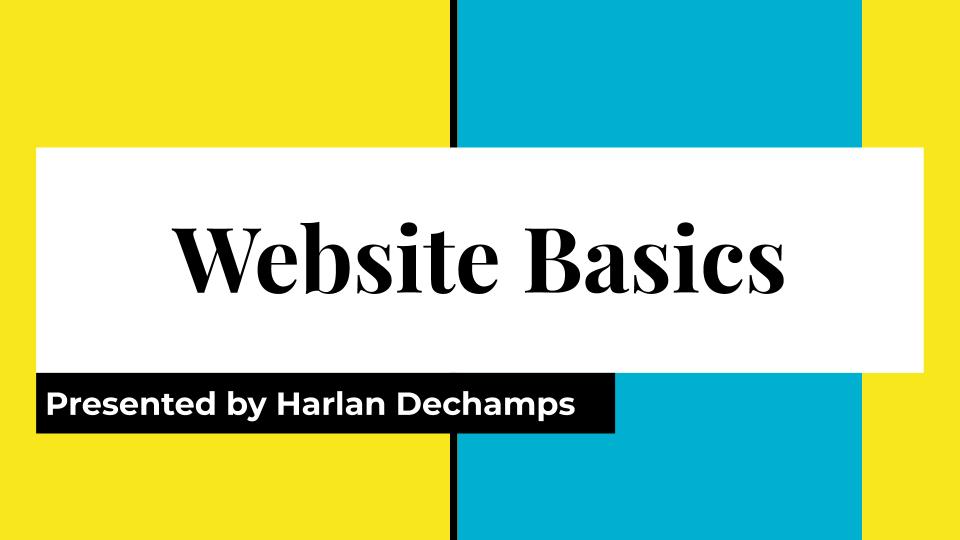Originally presented at the Inklings weekly meeting by Harlan Dechamps.
Have you been debating whether or not you need a website as an author? I put together this presentation for the Inklings Guild members, and hopefully it will help guide you in your decision!
Why should I bother with a website?
- The website is the hub of your online presence
- It’s the one place where users can find everything about you:
- Books
- Musings
- Information about you and others you’ve worked with
- Where else to find you online
- People are nosy
- Even agents admit they will do a precursory search of potential authors, to determine how they choose to portray themselves online to the public
Domain & Hosting
In order to have a website, you must start with hosting space and a domain.
What is a domain?
The domain is the actual address that users type into their web browser to get to your website.
For example: inklingsguild.com or www.inklingsguild.com
Technically, inklingsguild.com is the domain, and www. is a subdomain. A subdomain is a part of a domain, usually pointing to a folder located on the site.
In order to have a domain, you must purchase it with a registrar. I suggest namecheap.com as they provide a straightforward and reliable service, and don’t try to get you to buy into additional services that you do not need (like some of the more recognizable registrars, which will charge you much more than you need to pay and may not include basic services).
Many times, web hosts will offer free domain registration with purchase of hosting space, so be sure to check that first!
What is hosting?
Hosting is where your site physically resides on the internet. When you purchase hosting space, it means you are purchasing space on a server that physically exists somewhere.
After you purchase hosting space, you’ll need to set up your domain to point to your host, so that web browsers know where to send a user when they type the domain in. These two services work in tandem to ensure your site is delivered properly to your users.
I suggest FastComet for hosting. Their hosting service is extremely reliable and the lowest tier of hosting includes everything you should need when you are just starting out. Their plan includes daily backups of your website, which pays for itself.
If you have more questions about domain registration and hosting, please feel free to leave me a message and I will be happy to answer or possibly work it into a future post or presentation.
Choosing a Content Management System
While long ago, sites used to be built with just HTML and updating them was left to programmers, the standard now is to use a content management system as the base of your site. These systems are relatively simple to set up, or to find someone to set them up initially, and then are build to be as painless as possible for you to update and contribute content.
I’ve chosen three of the most popular content management systems for authors and reviewed the pros and cons of each. I’m a bit biased toward WordPress, as I have built many a site in it and it is extremely flexible, and will grow with you and your needs, but there are other viable options, and it comes down to what you prefer and what works for you!
Wix
- Easy to use
- Can’t switch themes after you publish (you’re stuck with it unless you want to start from scratch)
- Limited to what the system can do and how it does it
- Limited in design
Weebly
- Confusing interface compared to others
- Limited to what the system can do and how it does it
- Limited in design
WordPress
- Best for SEO
- More complicated, but can be made easier (I am happy to create a how-to presentation/post series revolving around this as well)
- Flexible: endless opportunity of what the site can do
- Can grow with you as you publish and/or need to offer more (you can keep the system you’ve become most familiar with), and with well over 50,000 plugins available, you can likely find one that does anything you need without needing to call in a programmer.
- Easy to use app interfaces for publishing blog posts or making updates on the go
- It’s been around forever and has a huge community, so it’s easy to get support/help
Getting Started with Planning
I recommend visiting several author sites that you like and creating a list of what you feel works and doesn’t work for them. Be extremely critical and honest, especially regarding usability and organization, as this will help you create a site that works well for you!
I’ll continue this discussion in another post about Organizing Content: Creating a Sitemap that works for YOU

